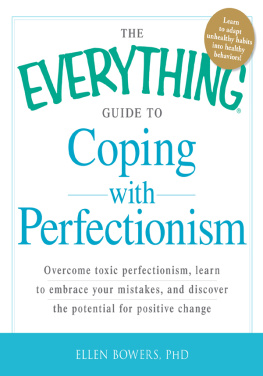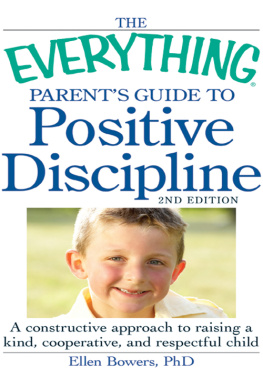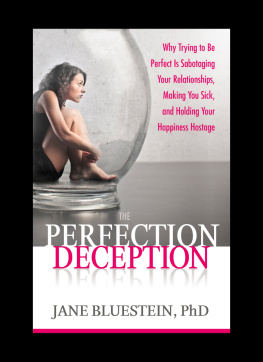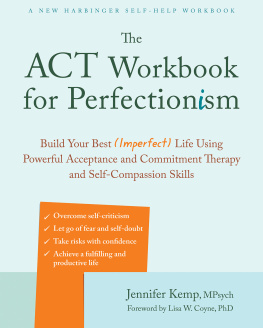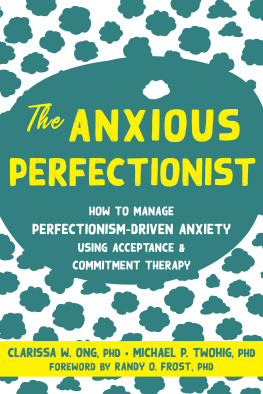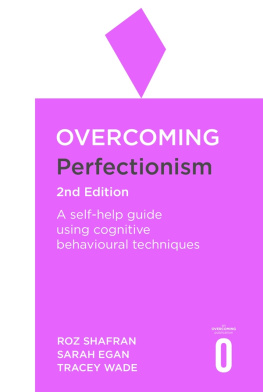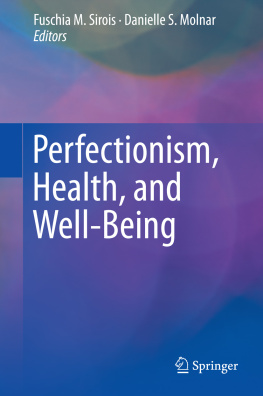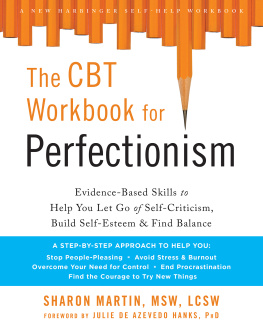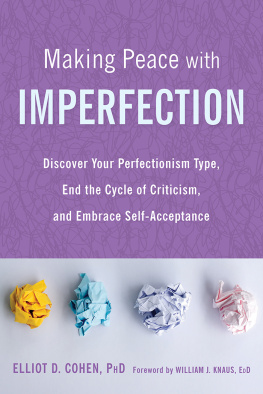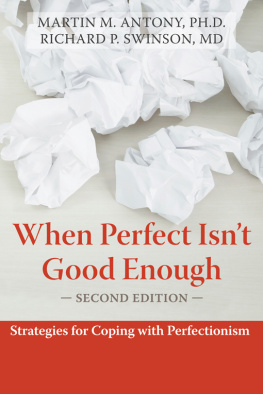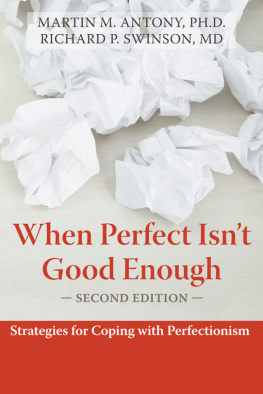
GUIDE TO
COPING WITH PERFECTIONISM
Dear Reader,
It is a cosmic stroke of luck that I have been invited to share with you some thoughts, experiences, and discoveries about the slippery topic of perfectionism. For me, being perfect at many things brought momentary pleasure, even honors, prizes, and awards, but at what cost? As Ive gone through situations where it is important to cooperate with others, as in a marriage, child-parent relationship, working within a group or with a client, I see that doing things perfectly is not such a great asset.
Being 100 percent on top of things makes others uncomfortable. Always being on time or a few minutes early makes latecomers nervous. Always having a good answer can make others feel incompetent or unimportant. It can be an act of grace to be an accepting, attentive presence and smooth out the kinks later on.
If you have a monster within you that shouts youre not doing things fast enough, perfectly enough, or whatever else enough, this book can help quiet that voice. We can work together to lighten up unrealistic expectations, and in the process, open the door to the incredible wonder of life and people around you, however quirky and flawed.
Appreciatively,


These handy, accessible books give you all you need to tackle a difficult project, gain a new hobby, comprehend a fascinating topic, prepare for an exam, or even brush up on something you learned back in school but have since forgotten.
You can choose to read an Everything book from cover to cover or just pick out the information you want from our four useful boxes: e-questions, e-facts, e-alerts, and e-ssentials. We give you everything you need to know on the subject, but throw in a lot of fun stuff along the way, too.
We now have more than 400 Everything books in print, spanning such wide-ranging categories as weddings, pregnancy, cooking, music instruction, foreign language, crafts, pets, New Age, and so much more. When youre done reading them all, you can finally say you know Everything!

PUBLISHER Karen Cooper
MANAGING EDITOR, EVERYTHING SERIES Lisa Laing
COPY CHIEF Casey Ebert
ASSOCIATE PRODUCTION EDITOR Mary Beth Dolan
ACQUISITIONS EDITOR Kate Powers
ASSOCIATE DEVELOPMENT EDITOR Eileen Mullan
EVERYTHING SERIES COVER DESIGNER Erin Alexander
Visit the entire Everything series at www.everything.com

GUIDE TO
COPING WITH
PERFECTIONISM
Overcome toxic perfectionism, learn to embrace your mistakes, and discover the potential for positive change
Ellen Bowers, PhD

The Everything Guide to Coping with Perfectionism
is dedicated to my friends, family, clients, and coworkers
who have tolerated my own perfectionism. Thank you.
Contents
Acknowledgments
The first thank you is to Kate Powers of Adams Media, who saw the tremendous need and potential for a book of this sort. Her enthusiasm and skill helped enormously to shepherd this work into fruition. The next thank you is to numerous friends and family members who contributed ideas, examples, and even begged to be case studies for the book. I am immensely appreciative of so much kindness and generosity, and I am grateful to know so many perfect people. Another thank you goes to the fabulous resources of the Glendale and Pasadena public libraries. I cannot live without you. And finally I wish to thank Fay, Orchid, Jeanine, and my stalwart Sunday group for consistent interest and support.
Top 10 Signs of Suffering from Perfectionism
- Never feeling relaxed or at peace.
- Always wanting to be the best, the first, the greatest.
- Feeling driven to have the last word in arguments or conversations.
- Feeling deeply tired much of the time.
- Believing that your accomplishments are of little or no value.
- Wanting to chuck everything and start over with a new job or new spouse.
- Physical symptoms such as insomnia, heart palpitations, skin disorders.
- High anxiety because of having so many things to do.
- Your closest relationships lack warmth and comfort.
- The sensation of having an enormous hole in your soul.
Introduction
MOST PEOPLE THINK of perfectionism as a good thing. Whats wrong with working hard to reach lofty goals? But perfectionism can go too farmuch farther than pulling all-nighters to hand in the perfect paper or cleaning the house until it shines. Toxic perfectionism can result in obsessive behavior, damaged self-esteem, depression, and even physical ailments.
Perfectionism is rampant in modern culture. The pressures of the media, working hard to sustain a career, the rising cost of living combined with dwindling job opportunities, somewhat fragmented families, and the faster pace of life all contribute to unrealistic expectations of oneself and others. The result can be a sort of dark, pervasive irritability and short-temperedness in every conversation and human exchange.
Have you eavesdropped lately on anyone ordering his or her favorite latte? More than likely, the instructions are delivered in a clipped, terse voice, and the barista is doomed if he uses 2 percent milk instead of soy. Have you overheard a young parent giving last-minute instructions to a beleaguered child as she is dropped off at school or daycare? Dont mess up your new dress, and Remember what I said about being friendly to little Mike who has just joined the class, or Eat all your vegetables, and remember to phone me at four oclock, and dont lose the cell phone. All this for a five-year-old!
The faster pace of communication, availability of infinite amounts of information in print or on the Internet, and the constant blasts of media cause people to feel that they are always behind, not quite up on the latest news, or impossibly inept at following the latest fashion trend or movie releases. It makes a person tired before he or she even begins the day. Even enormously bright, capable people are overwhelmed by the perfectionistic standards of todays society. And then there are those who simply give up trying.
Perfectionism can be a huge motivating factor for tremendous achievement. A young pianist memorizes and performs the entire repertoire of Bachs Preludes and Fugues. An aspiring skater practices every day and competes in the Olympics. Ordinary people diet and work out in order to be a little healthier. A young, eager husband engages in therapy in order to learn more effective ways to communicate with a delicate-natured wife. A traveler memorizes dozens of sentences in a foreign language before taking an adventurous trip.

